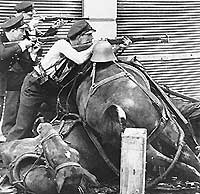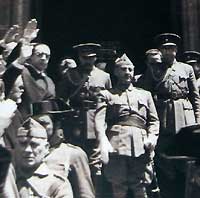Political Turmoil, Civil War and Franco Dictatorship
1898 - 1975
 Valencia
entered the XX century on a very liberal streak, with Blasco
Ibanez elected into the government. Popular with the working class
and of a socialist tilt, Blasco Ibanez contributed strongly to Valencia's
leftist political evolution. Valencia
entered the XX century on a very liberal streak, with Blasco
Ibanez elected into the government. Popular with the working class
and of a socialist tilt, Blasco Ibanez contributed strongly to Valencia's
leftist political evolution.
The 1898 war with the United States left Spain in economic and social
turmoil, leading to proliferation of radical movements (from socialist
to fascist). King Alfonso XII resolved the situation by appointing General
Primo de Rivera as dictator in 1923. Rivera's rule was a genuine temporary
fix patch and he was generally well accepted by the people of Spain.
However, by the end of the 1920s the Spanish economy had new troubles
and once Rivera saw that the public opinion turned against him, he voluntarily
left his post.
King Alfonso abdicated in April 1931, following a Republican victory
in municipal elections. Spain was proclaimed a Republic, under a center-left
government.
In 1933 women were allowed to vote for the first time and many shared
more conservative views. As a result, a right-wing government came to
power on a narrow margin. In 1936 this narrow margin occured again, but
in favour of the left. Intensely polarised and radicalised, the two sides
gave a call to arms.
Valencia followed these general trends throughout the period, overall
remaining on a moderate left. A stereotypical Valencian family of the
time is joked to have been a socialist manifest branding husband and a
fevereshly praying conservative wife. Now that the Civil War had started,
Valencia found itself deeply inside the Republican (left) front, combating
the Nationalist (right) forces of General Francisco Franco.
As early as November 1936 the capital of the Republican government was
moved to Valencia, amidst fears of losing Madrid, and remained there until
the end of the war in 1939. The frontline never reached Valencia, although
bombings were frequent. Valencia turned into the reddest spot on the map
of Spain, with the Republican elite flocking to the capital.
On 30 March 1939, after the fall of Catalunia and most other Republican
territory, Valencia capitulated to Franco's forces, thus ending the war.
 Once
victory was announced, General Franco began his rule as a dictator. Those
were hard times for Valencia, as for the rest of Spain. Although the anti-separatist
repressions were fairly mild here (due to Valencia's traditionally more
moderate stance than that of Catalunia and the Basque Country), economic
hardship was dark as Spain became politically and economically isolated
due to its links with fascist regimes. While cultural nationalism was
strongly discouraged, Valencian identity remained largely preserved since
it relied less on institutional education (such as language and legal
framework) and more on the cultural events (read: fiestas) with a strong
Catholic aspect, thus being to the taste of ultra-Catholic Franco. Once
victory was announced, General Franco began his rule as a dictator. Those
were hard times for Valencia, as for the rest of Spain. Although the anti-separatist
repressions were fairly mild here (due to Valencia's traditionally more
moderate stance than that of Catalunia and the Basque Country), economic
hardship was dark as Spain became politically and economically isolated
due to its links with fascist regimes. While cultural nationalism was
strongly discouraged, Valencian identity remained largely preserved since
it relied less on institutional education (such as language and legal
framework) and more on the cultural events (read: fiestas) with a strong
Catholic aspect, thus being to the taste of ultra-Catholic Franco.
Franco had a design for every region of Spain and the strength of Valencia
in times of an economic crisis was its vast agricultural assets. While
Barcelona, for example, was seen by him as more of an industrial powerhorse,
Franco boosted Valencia to become Europe's orange plantation. In 1950s
Valencia's orange exports became famous throughout the world.
The year of 1957 is a major memory for Valencia, although of strictly
local importance. River Turia (then flowing through the middle of the
city) flooded, killing many people and ruining the city. Valencia received
disaster aid from the rest of Spain and next year made a special edition
of the Fallas, inviting all Spanish regions to turn it into a national
event, and hosting Franco as the guest of honour. River Turia was consequently
diverted to the south of the city and the former river bed was converted
into a lush leisure garden, giving
Valencia much of its emblematic charm today.
The 1960s-70s were an era of Development by the Franco regime, with much
of Valencia re-shaping its infrastructure and modernising.
|